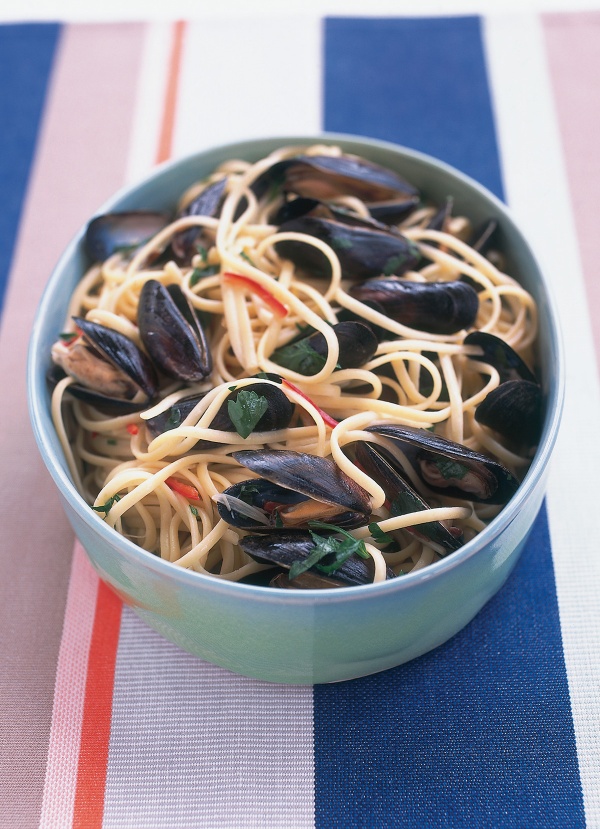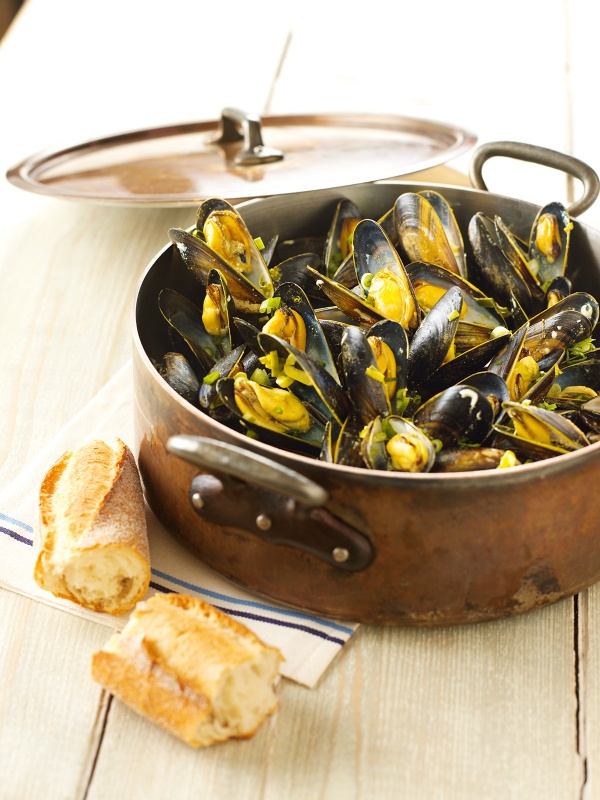Dutch Mussels
by NigellaIntroduction
The Dutch do love their mussels, honoured there as zwarte goud — black gold — although it’s true that their neighbours the Belgians unfairly get more credit for them. Of course, you don’t need to make these with actual Dutch mussels: this recipe is so-called more for the beer I cook them in. The first time I ordered mussels cooked in beer — at a restaurant in Amsterdam, many years ago — I worried that the bitterness might be intrusive, but that first mouthful of deep, rich broth put me right.
The key, I feel, and it’s how I cook them, is to use butter, and lots of it: it balances the bitterness of the beer, and seems to help thicken the broth sweetly as the mussels steam. The fennel I cook in said butter before adding the mussels to the pan is also what you might call a Dutch touch: it’s a combination much favoured there — and elsewhere, too, it’s true: its gentle aniseed flavour softens on cooking to provide a light herbal sweetness that highlights the bolstering brininess of the mussels. It’s a classic combination for a reason. Fennelphobes could, of course, use shallots instead, but the aniseed flavour is sufficiently muted for all but the most aniseed-antagonistic palates. But I, very much a fennelphile, punch up the aniseed element with an exuberant amount of fresh dill, along with an equally enthusiastic scattering of parsley and chives.
The mussels themselves take no more than a few minutes to cook, and the fennel and garlic that are called on to provide their aromatic flavours first hardly need a great deal of time in the pan, making this a sumptuous speedy feast.
The Dutch do love their mussels, honoured there as zwarte goud — black gold — although it’s true that their neighbours the Belgians unfairly get more credit for them. Of course, you don’t need to make these with actual Dutch mussels: this recipe is so-called more for the beer I cook them in. The first time I ordered mussels cooked in beer — at a restaurant in Amsterdam, many years ago — I worried that the bitterness might be intrusive, but that first mouthful of deep, rich broth put me right.
The key, I feel, and it’s how I cook them, is to use butter, and lots of it: it balances the bitterness of the beer, and seems to help thicken the broth sweetly as the mussels steam. The fennel I cook in said butter before adding the mussels to the pan is also what you might call a Dutch touch: it’s a combination much favoured there — and elsewhere, too, it’s true: its gentle aniseed flavour softens on cooking to provide a light herbal sweetness that highlights the bolstering brininess of the mussels. It’s a classic combination for a reason. Fennelphobes could, of course, use shallots instead, but the aniseed flavour is sufficiently muted for all but the most aniseed-antagonistic palates. But I, very much a fennelphile, punch up the aniseed element with an exuberant amount of fresh dill, along with an equally enthusiastic scattering of parsley and chives.
The mussels themselves take no more than a few minutes to cook, and the fennel and garlic that are called on to provide their aromatic flavours first hardly need a great deal of time in the pan, making this a sumptuous speedy feast.

Share or save this
Ingredients
Serves: 2
- 75 millilitres Dutch or other light beer/lager (preferably not from the fridge)
- 1 kilogram mussels (cleaned and debearded)
- small fennel (approx. 225g/8oz)
- 45 grams unsalted butter
- 2 cloves garlic (peeled)
- 1 teaspoon finely chopped dill stalks, plus 2 tablespoons of roughly torn fronds
- 2 tablespoons chopped parsley, plus 2 tablespoons more to sprinkle on at the end
- 2 tablespoons finely chopped chives plus 2 tablespoons more to sprinkle on at the end
TO SERVE
- good bread for dunking
- 5 tablespoons Dutch or other light beer/lager (preferably not from the fridge)
- 2¼ pounds mussels (cleaned and debearded)
- small fennel (approx. 225g/8oz)
- 3 tablespoons unsalted butter
- 2 cloves garlic (peeled)
- 1 teaspoon finely chopped dill stalks, plus 2 tablespoons of roughly torn fronds
- 2 tablespoons chopped parsley, plus 2 tablespoons more to sprinkle on at the end
- 2 tablespoons finely chopped chives plus 2 tablespoons more to sprinkle on at the end
TO SERVE
- good bread for dunking
Method
- Open the beer, and measure out the 75ml/5 tablespoons in a little jug, to help defizz it. Then put the mussels into a large bowl, cover abundantly with cold water, and leave to soak for 15 minutes. Once they have soaked, drain them, and go through them one by one, discarding any that stay open. Don’t even contemplate leaving this step out.
- Cut off the chimney-like stems from the fennel, halve the bulb, then cut away most of the core, but do keep the almost-acid-green fronds. Then, with the cut sides flat on a chopping board, slice the halved fennel widthways as thinly as you can. You don’t need these slices mandolin-slicer fine, by the way, just thin by normal, human standards.
- Melt the butter in a sturdy, wide pan — mine’s a whisper under 27cm/10 inches diameter — with a tightly fitting lid over low heat, then add the finely sliced fennel, stirring it well into the golden pool of butter, then clamp on the lid, and let it cook, thus covered, for 3 minutes, though don’t move very far away as you need to lift up the lid from time to time to check the fennel isn’t catching, giving a little stir as you do so.
- When it’s had its 3 minutes, remove the lid, and stir in 2 tablespoons of the beer, then put the lid back on and cook gently on low for a further 2 minutes. If the fennel’s not softened by then — though it will still offer a little resistance — then just put the lid back on and cook for a little longer, adding another tablespoon of beer if needed.
- Take the pan briefly off the heat, remove the lid, and mince or grate in the garlic, and add the teaspoon of chopped dill stalks along with the 2 tablespoons each of chopped parsley and chives. Put the pan back on low heat, and cook, stirring, with the lid off for a minute.
- Pour in the remaining beer, and turn the heat up to high, giving the pan a little stir, which suddenly seems to turn the beer into an almost opaque, creamy liquid.
- When this liquid starts to bubble, tip in the prepared mussels and clamp on the lid. Cook on high for about 4 minutes shaking the pan gently every now and again, by which time the mussels should be cooked, the shells gaping open to revealing their golden treasure. You might need a little longer if the mussels are very heaped up in the pan.
- Transfer the opened mussels to a warm, waiting bowl, making absolutely sure you chuck out any that have stayed closed. Keep the pan with the juices on high heat for just another minute to thicken and intensify the broth a little, before spooning it over the mussels in their bowl. Using a couple of forks, distribute the straggly fennel slices evenly; I tend to tuck them around the mussels rather than leave them all on top.
- Scatter over the extra parsley and chives, and then sprinkle over the dill fronds, along with any fennel fronds you’d set aside. Remember to bring a detritus bowl to the table along with the mussels and — ideally — some bread for dunking into the aromatic juices.
- Open the beer, and measure out the 75ml/5 tablespoons in a little jug, to help defizz it. Then put the mussels into a large bowl, cover abundantly with cold water, and leave to soak for 15 minutes. Once they have soaked, drain them, and go through them one by one, discarding any that stay open. Don’t even contemplate leaving this step out.
- Cut off the chimney-like stems from the fennel, halve the bulb, then cut away most of the core, but do keep the almost-acid-green fronds. Then, with the cut sides flat on a chopping board, slice the halved fennel widthways as thinly as you can. You don’t need these slices mandolin-slicer fine, by the way, just thin by normal, human standards.
- Melt the butter in a sturdy, wide pan — mine’s a whisper under 27cm/10 inches diameter — with a tightly fitting lid over low heat, then add the finely sliced fennel, stirring it well into the golden pool of butter, then clamp on the lid, and let it cook, thus covered, for 3 minutes, though don’t move very far away as you need to lift up the lid from time to time to check the fennel isn’t catching, giving a little stir as you do so.
- When it’s had its 3 minutes, remove the lid, and stir in 2 tablespoons of the beer, then put the lid back on and cook gently on low for a further 2 minutes. If the fennel’s not softened by then — though it will still offer a little resistance — then just put the lid back on and cook for a little longer, adding another tablespoon of beer if needed.
- Take the pan briefly off the heat, remove the lid, and mince or grate in the garlic, and add the teaspoon of chopped dill stalks along with the 2 tablespoons each of chopped parsley and chives. Put the pan back on low heat, and cook, stirring, with the lid off for a minute.
- Pour in the remaining beer, and turn the heat up to high, giving the pan a little stir, which suddenly seems to turn the beer into an almost opaque, creamy liquid.
- When this liquid starts to bubble, tip in the prepared mussels and clamp on the lid. Cook on high for about 4 minutes shaking the pan gently every now and again, by which time the mussels should be cooked, the shells gaping open to revealing their golden treasure. You might need a little longer if the mussels are very heaped up in the pan.
- Transfer the opened mussels to a warm, waiting bowl, making absolutely sure you chuck out any that have stayed closed. Keep the pan with the juices on high heat for just another minute to thicken and intensify the broth a little, before spooning it over the mussels in their bowl. Using a couple of forks, distribute the straggly fennel slices evenly; I tend to tuck them around the mussels rather than leave them all on top.
- Scatter over the extra parsley and chives, and then sprinkle over the dill fronds, along with any fennel fronds you’d set aside. Remember to bring a detritus bowl to the table along with the mussels and — ideally — some bread for dunking into the aromatic juices.
Additional Information
MAKE AHEAD / STORE: It is not advisable to make ahead or store.
MAKE AHEAD / STORE: It is not advisable to make ahead or store.





Tell us what you think
Thank you {% member.data['first-name'] %}.
Explore more recipesYour comment has been submitted.